New features: Event flows, revamped alert view, sleek reports, and much more
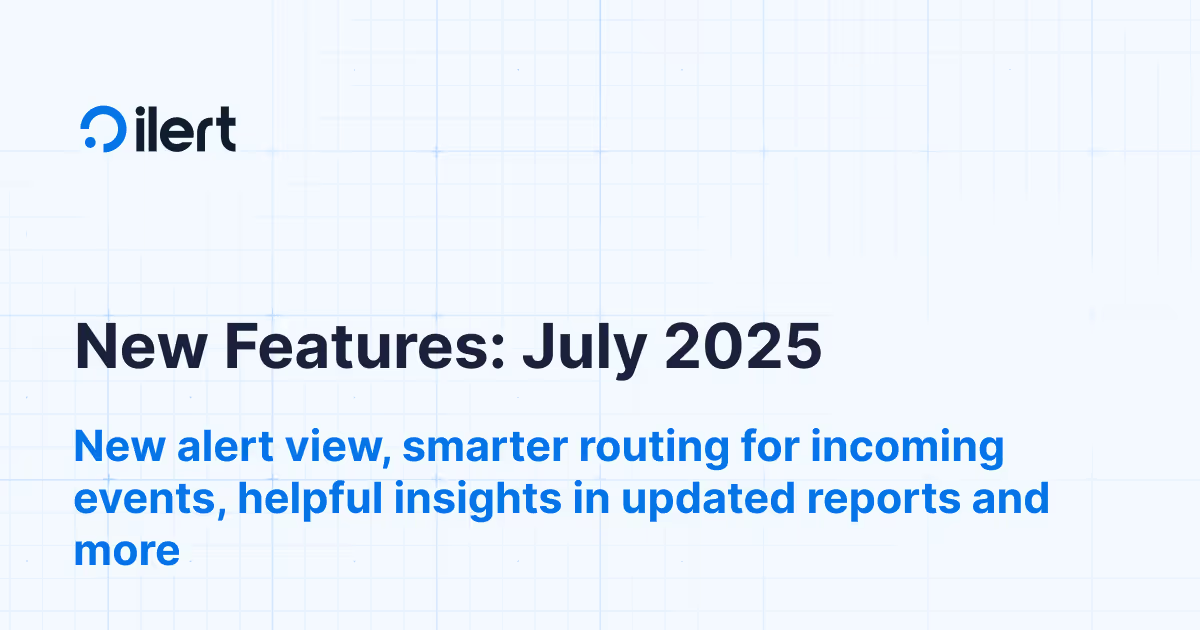
As you know, we've introduced a major update in recent months – ilert Responder – the AI Agent that helps you run root cause analysis during incidents and provides recommendations toward faster resolution. That's not all, and there are way more powerful features to share with you. Feel free to reach out to us via chat or at support@ilert.com if you have questions or if you want to propose a feature or improvement.
New Alert view: Built for real-time collaboration and AI assistance
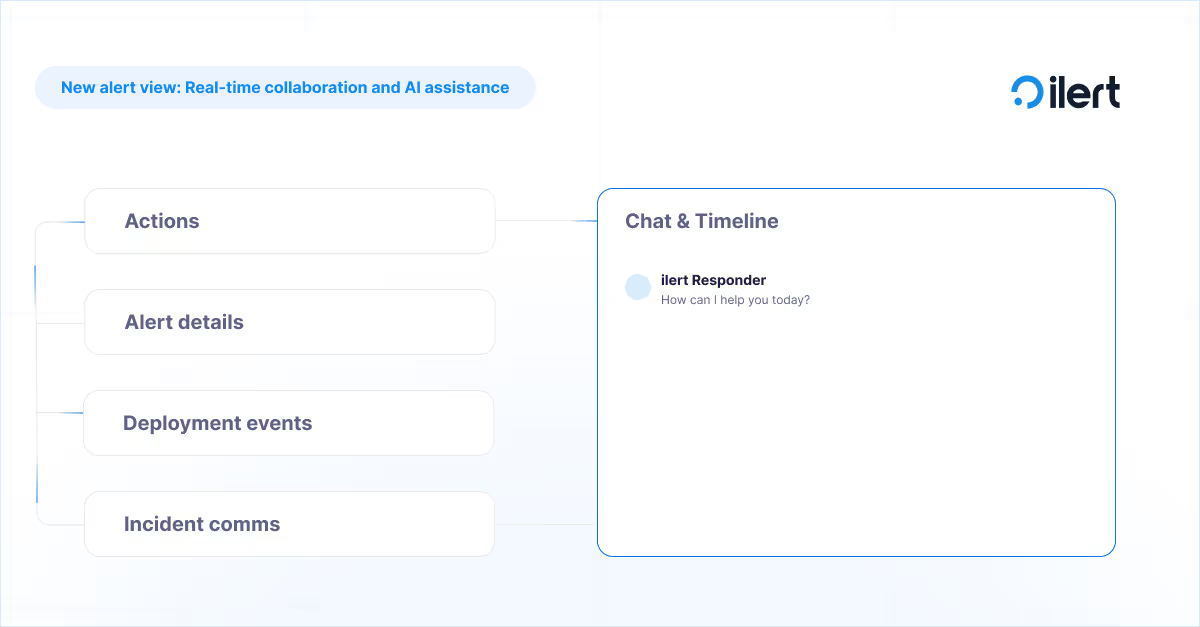
To better support real-time collaboration and prepare for the next round of AI features, we introduced a revamped alert view. There are various collapsible sections displayed, allowing you to open only those that are important to you at the moment. The platform automatically opens the ones that are likely important to you by default. Apart from the ‘Alert details,’ ‘Deployment events,’ and ‘Incident communications,’ which are long familiar to you, you will notice the ‘Actions’ section with the list of recommendations from the ilert Responder and ‘Logs and data’ relevant to the received alert.
On the right side, you will see that the timeline now shares space with the chat which capabilities are also significantly enhanced. You can use threads to keep communication clean, tag colleagues, and leave emojis. And, most importantly, you can communicate with ilert AI in the same environment by simply mentioning it via @. Moreover, ilert chat mirrors the communication happening in the war room in Microsoft Teams. This new view brings alerts, context, and collaboration into one place, helping teams make faster and informed decisions in the heat of an incident.
Event Flows: Smarter routing for incoming events
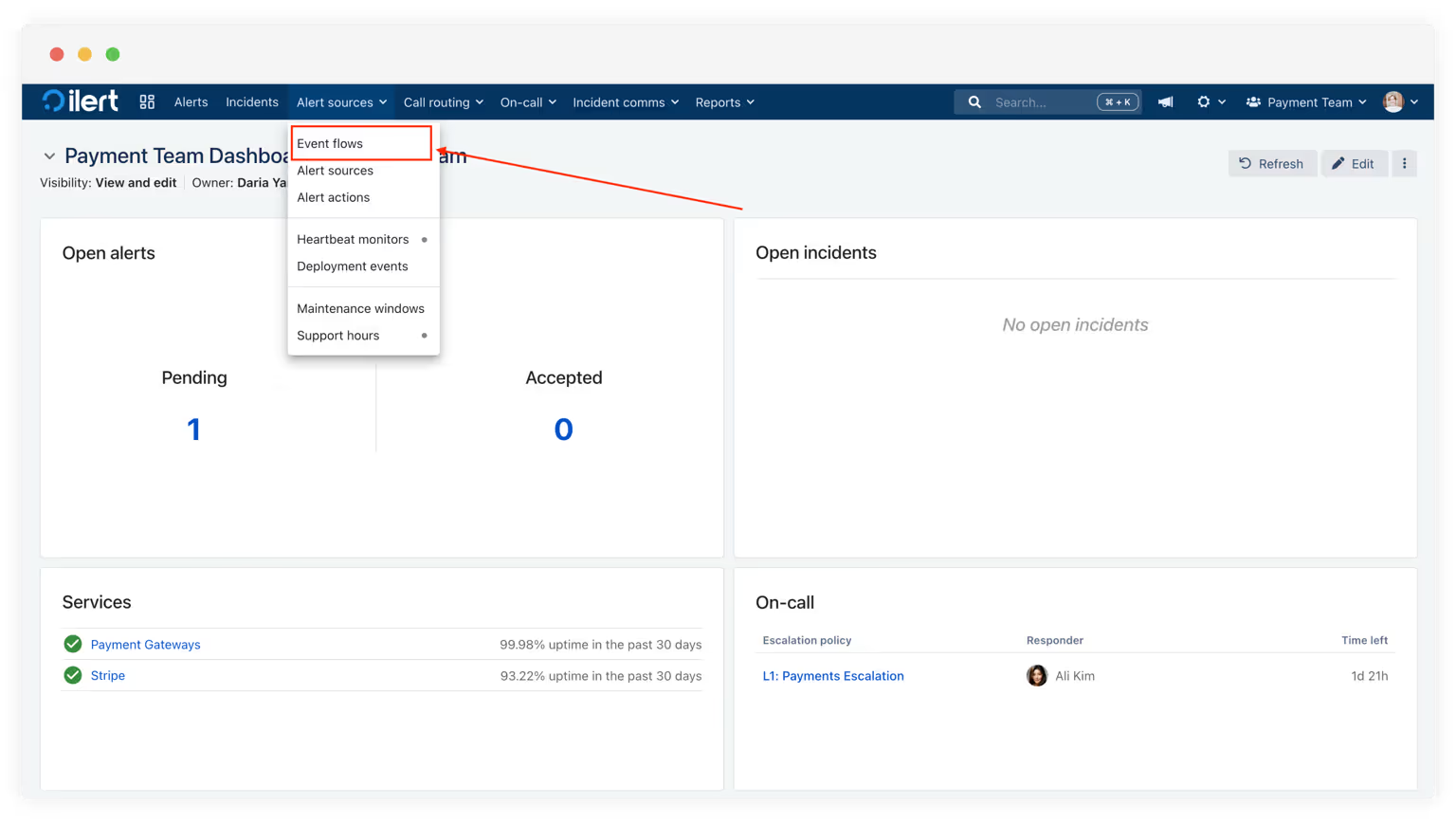
With Event Flows, ilert introduces a powerful and flexible way to process incoming events before they are converted into alerts. The feature allows you to build dynamic, rule-based workflows that determine how events are handled, routed, or filtered – all through a simple visual interface.
This makes Event Flows perfect for organizations that deal with a large volume of alerts or operate across multiple teams. Instead of manually managing routing rules across alert sources, you can centralize your logic in one reusable flow. Whether you want to send database-related events to your DB ops team, ignore low-severity alerts outside of business hours, or escalate critical alerts directly to on-call responders, Event Flows give you the tools to do just that.
At the core of every Event Flow is the Incoming Event block. You can connect it to one or multiple integrations or custom event sources using ilert's Event API. Once connected, you gain full control over how these events should behave. For example, you can add conditional branches that inspect event content, such as custom fields, labels, or summaries, and direct them down different paths depending on the logic you define.
You can also integrate Support hours checks into your workflows, ensuring that notifications respect team availability. If no conditions match, a default "else" path ensures that the event still continues downstream without being lost.
Built with teams in mind, Event Flows can be assigned to one or more teams in ilert, making them easily reusable and manageable across larger organizations.
If you have suggestions for other nodes, don't hesitate to contact our support team or submit your idea in the ilert Roadmap.
Smarter insights with Reports 2.0
Check out the refreshed experience for all Reports, including Notifications and On-call reports. With a sleek design and enhanced filtering options, you can now quickly break down notifications and on-call activities by user, team, or custom time periods – helping you detect patterns and gain clarity.
The updated On-call reports show detailed logs of shifts, including time spent on each alert. Here, you also have more filtering options to fine-tune reports to various needs and audiences. This update enables better compensation tracking and fairness across teams. With Reports 2.0, ilert gives you deeper visibility into alert fatigue, delivery success, and overall incident response performance.
Overlay public holidays directly in your on-call schedules
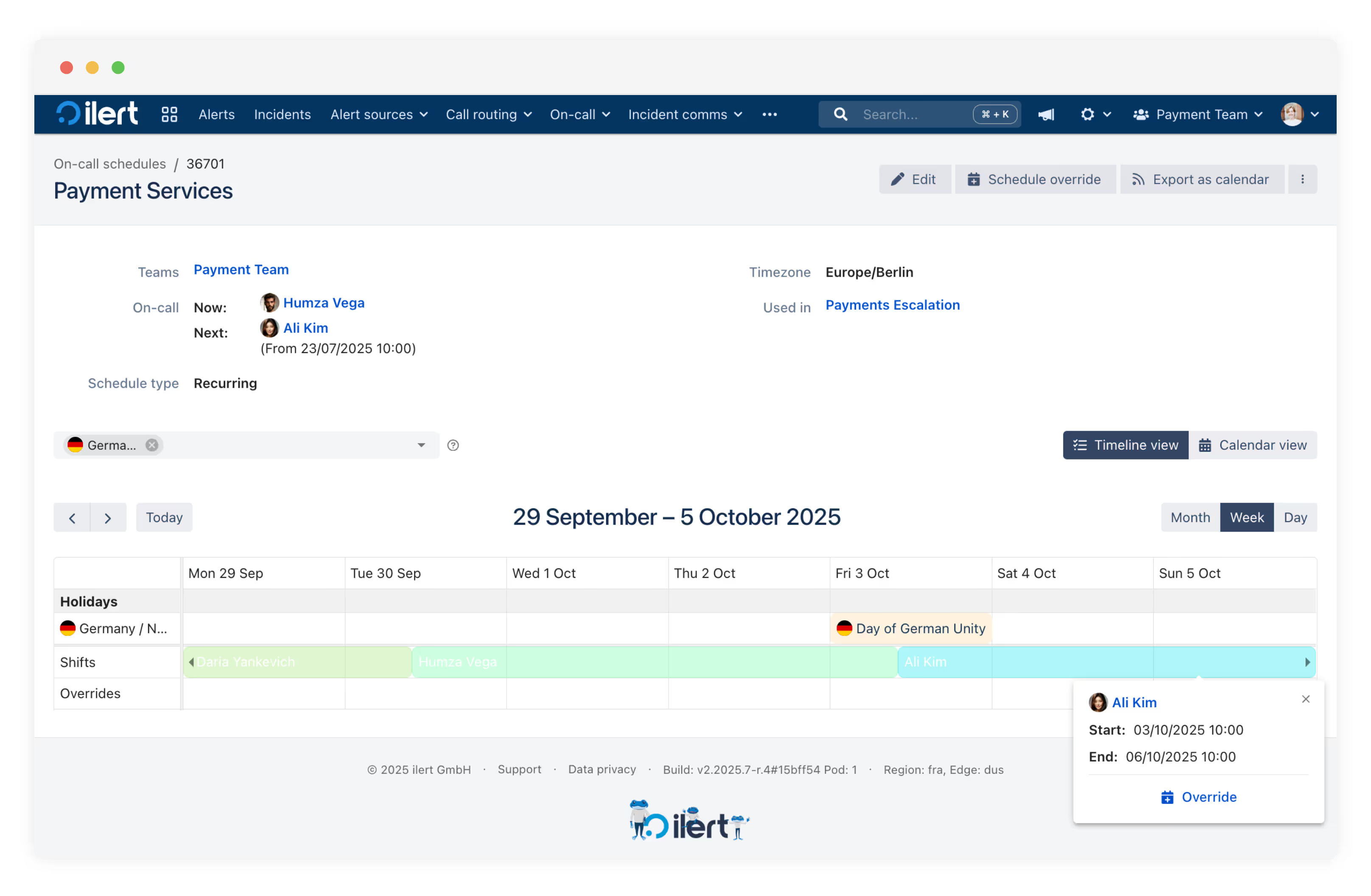
Creating one-time schedule overrides just got easier. With the new holiday calendar overlay, ilert now displays relevant national holidays directly within the on-call schedule detail view. This removes the need to check external calendars and reduces setup errors. Simply spot holiday conflicts at a glance and create overrides with fewer clicks, improving coverage and reducing time spent managing schedules. You will probably also notice an overall elevated view of on-call schedules, as we overhauled its design.
‘Undo’ and ‘Regenerate’ options in AI-assisted incident communication
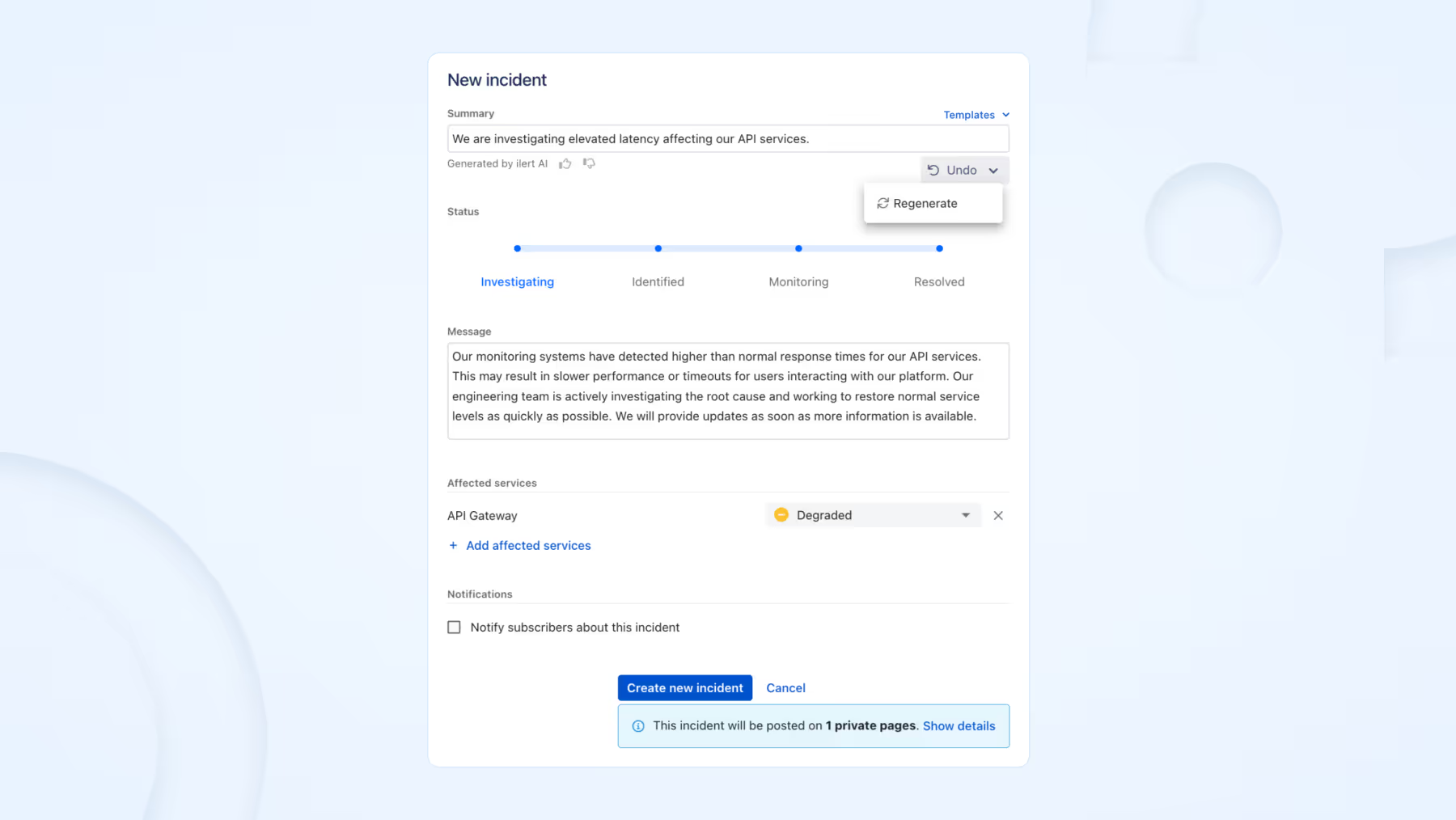
Managing incidents with AI just got more flexible. The latest ilert update enhances the AI-assisted incident comms workflow by giving users more control over the generated content. Now, when you press ‘Generate,’ ilert creates the incident summary and message based on your input and automatically displays a preview. Once generation completes, the Generate button transforms into a menu with two new actions:
- Undo: Reverts back to your previously entered summary and message.
- Regenerate: Creates a new version of the incident text based on your latest changes.
This allows for fast iteration without losing your original input, saving time and reducing errors in high-pressure moments. Additionally, the notification preview box at the bottom of the screen now clearly shows which status pages the incident will be posted on and how many subscribers will be notified. This ensures full visibility before you click ‘Create new incident’.
A few more improvements
Bulk-link alerts to incidents from the alert list. Managing multiple alerts just became more efficient. The alert list page now supports bulk actions, allowing you to select multiple alerts and link them to a single incident in one go. This speeds up incident management, especially during larger outages or correlated alert storms, reducing manual work and ensuring better alert-to-incident traceability.
ilert now supports labels. Labels are key-value pairs that add structured context to alerts and events. Labels make it easier to filter, route, and analyze incidents based on relevant information. They’re fully integrated with ICL and ITL, allowing dynamic routing, filtering, and automation based on runtime context. While we started with the event API and alerts, we are looking forward to bringing new filter options to all entities across the board.
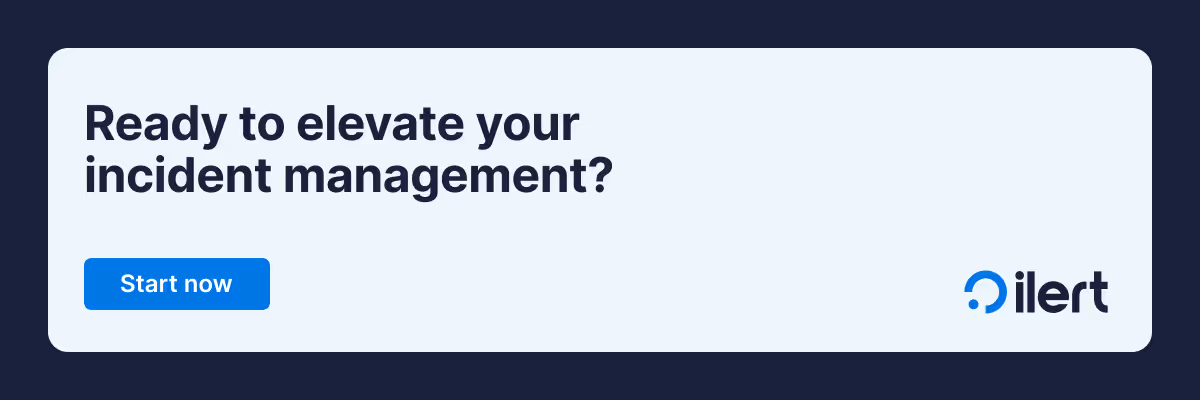
Even better heartbeats. To prevent misconfigurations, ilert now prompts you if you try to save a heartbeat without selecting an alert source, ensuring you don’t accidentally create silent monitors. Additionally, you can customize the message for heartbeat pings. You’ll also now see your current heartbeat monitor usage directly in the ‘Usage & limits’ section (top right corner of the screen, under a cog icon), giving you better visibility and control.
Haven't yet tried ilert Heartbeat 2.0? Test it out together with the fully revamped Email alert source.
Alert actions are displayed in the ilert Event Explorer. The Event Explorer is a real-time view into alert activity, showing detailed logs for every event sent to ilert. With the latest update, alert actions are now fully visible within the Event Explorer.
Markdown support for maintenance windows. You can now use Markdown in maintenance window descriptions. Whether editing in the management UI or displaying on status pages, your formatting – like bullet points, links, or code snippets – is now fully supported, helping you communicate planned downtime more clearly and professionally.
Auto-accept alerts for connected calls in Call flows. ilert’s Create Alert node in call routing now supports auto-accepting alerts on successful call connections. When the “Accept alert on answer” option is enabled, the first responder who picks up the call automatically accepts the alert, speeding up ownership assignment and eliminating manual steps. This feature improves clarity and reduces lag during voice-based incident acknowledgement. It also allows copying a legacy call routing behaviour when migrating to call flows.
Integrations

Connectwise. Automatically turn ConnectWise service tickets into ilert alerts. Keep your operations team in sync with real-time updates and streamline incident workflows between ITSM and on-call responders.
Alibaba CloudMonitor. Forward alerts from Alibaba Cloud CloudMonitor directly into ilert. Ensure critical metrics and events from your cloud infrastructure trigger the right on-call actions without delay.
Teamcity. Receive build and deployment failure alerts from JetBrains TeamCity in ilert. Stay on top of CI/CD issues and route incidents to the right developers instantly.
LibreNMS. Send network monitoring alerts from LibreNMS to ilert. Enhance your incident response by bringing SNMP and performance data into your centralized alerting and on-call system.


















